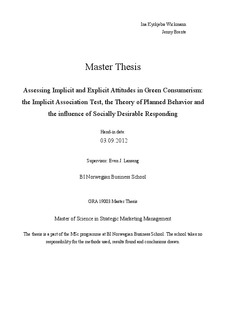| dc.contributor.author | Wickmann, Ina Kyrkjebø | |
| dc.contributor.author | Brente, Jenny | |
| dc.date.accessioned | 2013-02-08T12:05:08Z | |
| dc.date.available | 2013-02-08T12:05:08Z | |
| dc.date.issued | 2013-02-08 | |
| dc.identifier.uri | http://hdl.handle.net/11250/94943 | |
| dc.description | Masteroppgave(MSc) in Master of Science in Strategic Marketing Management - Handelshøyskolen BI, 2013 | |
| dc.description.abstract | The market for green products and services has expanded along with the increased public attention to environmental issues. Consumer research has relied mostly on direct measures of self-report. Despite the growth in consumers expressing positive attitudes and purchase intentions toward green products, the purchase rate for such products are still considerably low. Hence, there is a gap between what consumers say and what they do. The purpose of this study was to explore the relationship between explicit and implicit attitudes toward green products, as well as the role of Socially Desirable Responding bias on the relationship between direct and indirect measures. The study was conducted within the theoretical framework of the Theory of Planned Behavior (TPB), the Implicit Association Test (IAT) and theories of Socially Desirable Responding (SDR). A survey consisting of three parts was distributed to 257 participants through online panels. The first part consisted of a direct measure of explicit attitudes toward green products, grounded in the Theory of Planned Behavior. The second part was an indirect measure of implicit attitudes toward green and conventional products using the Implicit Association Test. The third part was a direct measure of Socially Desirable Responding measured by the Balanced Inventory of Desirable Responding scale. The explicit attitudes were found to be relatively more positive than the implicit attitudes toward green products. No correlations between explicit and implicit attitudes were found, supporting the dual attitude process view. The implicit attitudes toward green products were stronger than the implicit attitudes toward conventional products. Tendencies and partial support of socially desirable responding were revealed. Respondents with high scores on SDR displayed lower correlations between explicit and implicit attitudes toward green products than respondents with low scores on SDR. The study reveals that trusting direct measures of explicit attitudes in the context of green consumerism is unviable due to socially desirable responding and incoherence with implicit attitudes. The perceived behavioral control was found to have no effect on behavioral intention. This is a substantial contribution to the consumer vs. corporate social responsibility discussion. The fact that consumers do not feel they can make a difference in a positive way by consuming green indicates that social responsibility should not be placed on the shoulders of individual consumers. Practitioners need to acknowledge the complexity of green consumer behavior and need to consider alternatives to direct measures when assessing consumers’ attitudes toward ethical consumption. | no_NO |
| dc.language.iso | eng | no_NO |
| dc.subject | markedsføringsledelse marketing management strategisk strategic | |
| dc.title | Assessing implicit and explicit attitudes in green consumerism : the implicit association test, the theory of planned behavior and the influence of socially desirable responding | no_NO |
| dc.type | Master thesis | no_NO |
